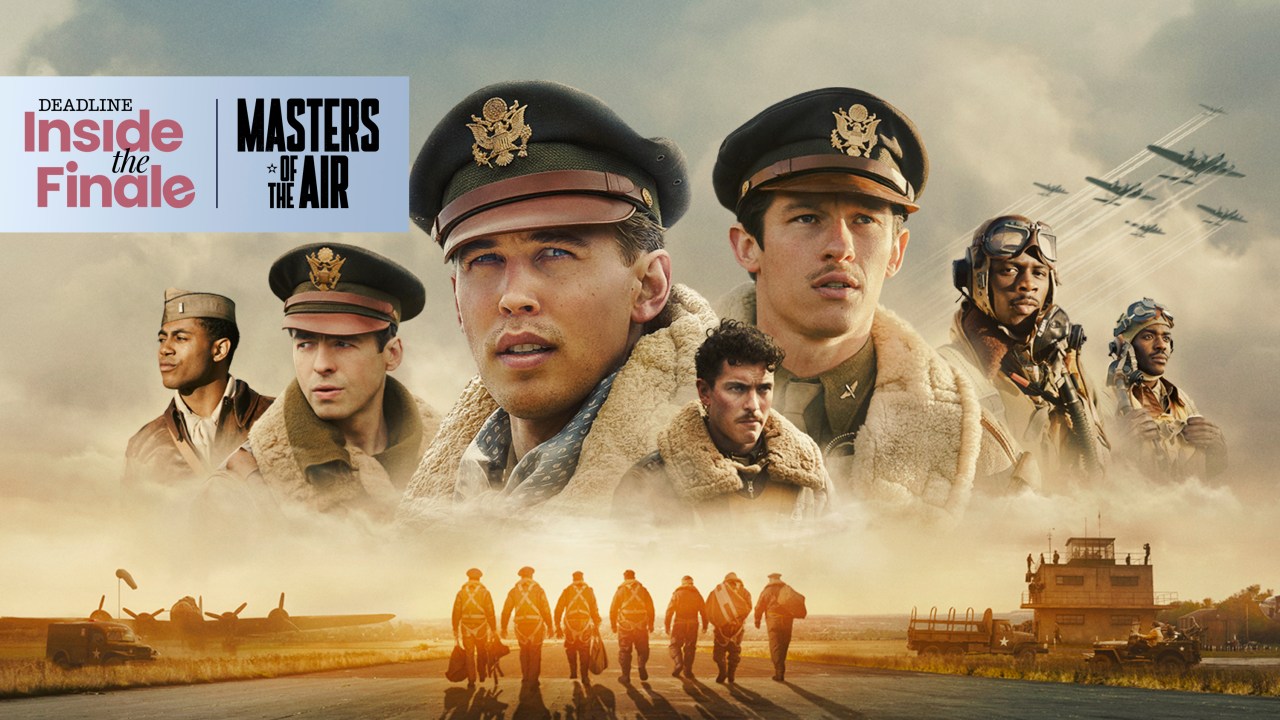Masters of the Air was a labor of love for executive producers Gary Goetzman, Tom Hanks and Steven Spielberg. The Apple TV+ series marks the third and final installment of the trio’s war drama miniseries, after Band of Brothers and The Pacific.
The series took three years to create and cost between $250 million and $300 million to produce, including a hefty $60 million in Covid compliance costs to film during the pandemic. The result was an epic nine-part series with 325 speaking parts and an amazing cast of up-and-coming actors.
“The best stories are from history,” said Goetzman during a discussion at the Deadline and Apple TV+ event Inside the Finale, joined by series cast members Barry Keoghan, Callum Turner, Rafferty Law, Josiah Cross, Nate Mann and Anthony Boyle. “Nonfiction is always more fascinating than fiction, and there’s no greater stories of human cost, triumph, passion, love… the biggest story of our world is keeping it in a democratic, beautiful place.”
Check out the conversation here.
Band of Brothers and The Pacific launched many outstanding careers — Tom Hardy, Rami Malek, James McAvoy, Damian Lewis and Michael Fassbender to name a few — and garnered 14 Emmy wins in total. If the audience reaction to the thrilling conclusion was any indication, Masters of the Air certainly stuck the landing and is on trend to surpass both of the previous series in accolades.
After a screening of the ninth and final episode of the epic series, Goetzman was joined by the cast on stage to discuss the series. While Austin Butler couldn’t attend, the crowd was filled with stars including Isabel May and Dua Lipa.
Starting out the cast for the evening was Callum Turner, who played Maj. John “Bucky” Egan. “There’s a lot I liked about Egan, and he has a temper, he drinks a lot… and he wants to have a good time, but underneath all of that is a human who wants the best for the world.” Turner, who recently starred in George Clooney’s The Boys in the Boat, says his attachment to the character was through Egan’s “ferocious spirit” and connection as best friend to Butler’s Maj. Gale Buck Cleven.
Rafferty Law began with some insight into how he was inspired by Sgt. Ken Lemmons, the crafty mechanic who patched up bullet-riddled planes to keep them airborne. “The thing that stuck out for me the most was just his willingness to lead by example,” said Law. “He was always spoken of as such a humble, loving person, and I think it’s really important to be able to bring that to the ground crew and show [from their perspective] what they were going through as these guys went off on missions and a lot of the time didn’t return.”
Barry Keoghan, Oscar-nominated for The Banshees of Inisherin and recently in Saltburn, insists his character, the heroic flyer Lt. Curtis Biddick, was “there in spirit” for the entire run. “The Irish kind of bring a sense of humor to massive things and try to kind of brush it under the carpet, so I wanted to humanize it and do that in a way.”
Josiah Cross’ character Lt. Richard D. Macon was a member of the Tuskegee Airmen, a group of African American military pilots who were often left out of the celebration once the war was finished. “They were left out of the newspapers,” said Cross, “so I wanted to put a face and voice to it to actually have people care, if that makes sense.”
“[Lt. Robert ‘Rosie’ Rosenthal] was just this warm handshake of a guy,” said Nate Mann. “He was a man of tremendous honor, but also this man of great warmth and grace.” Rosenthal reached the 25 piloting missions needed to get a ticket home, but kept going and reached 52 missions and was shot down twice. “You’re astounded by his choice to go back and remain with them, but he also led with such warmth so I tried to balance between those.”
Anthony Boyle, who also plays John Wilkes Booth in the Apple TV+ series Manhunt, had a different view of his character, Lt. Harry Crosby, than the rest of the cast. “I read the script for the first couple of episodes and everyone felt like they were in Band of Brothers, and Crosby felt like he was in an Adam Sandler B movie,” joked Boyle. “Everyone was being so very heroic and looking cool, and Crosby was going, ‘Oh God, I can’t do this,’ and throwing up on people. And I thought, ‘That’s the guy for me.'”
Crosby braved air sickness to become the division’s first navigator and guided pilots through treacherous bombing runs to take out German weapons factories and supply lines to bring the war to Hitler’s doorstep. “He’d been through so much trauma, so much hurt, so much heartache, and he still spoke with such humor and such lightness.” Boyle said.
“All of us sitting here, outside of Gary of course, come from a different generation,” began Cross before being interrupted by laughter from the audience as Goetzman feigned being insulted. He continued, “I feel like for us, there’s sometimes a detachment, right? Growing up, these stories felt like folktales in a way, so to be up close and personal connected to me that the story really happened.”
Cross’ point about the generational disconnect brings up an important question: Could we be as brave facing these hardships and circumstances? For Turner, it’s all about what is being fought for. “They were putting themselves in the most volatile situations know to mankind,” he said. “They did it because they were fighting for something they believed in, and they were fighting for each other.”


















